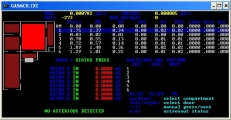Difference between revisions of "EECOM"
m (→Spacesim Adaptations: fixed broken links) |
m |
||
| (7 intermediate revisions by 4 users not shown) | |||
| Line 3: | Line 3: | ||
==History== | ==History== | ||
| − | [[Image:EECOM-HabSmall.JPG |frame|50x30px|The EECOM software aboard the | + | [[Image:EECOM-HabSmall.JPG |frame|50x30px|The EECOM software aboard the [[Hawking II]]]] |
Historically, EECOM stood for Electrical, Environmental, and Communications systems, though the communications part of the job was moved to a station called [[INCO Procedures|INCO]] during the Apollo program. EECOM monitored electrical systems including the fuel cells and cabin pressure control systems from the [[Mission Control]]. | Historically, EECOM stood for Electrical, Environmental, and Communications systems, though the communications part of the job was moved to a station called [[INCO Procedures|INCO]] during the Apollo program. EECOM monitored electrical systems including the fuel cells and cabin pressure control systems from the [[Mission Control]]. | ||
| Line 14: | Line 14: | ||
The EECOM station also contains the warning lights for imminent space-junk collision, known as the "asteroid watch." | The EECOM station also contains the warning lights for imminent space-junk collision, known as the "asteroid watch." | ||
| − | [[Image:EECOM-MCSmall.JPG |frame|The EECOM software in Mission Control. This contains radiation monitoring software.]] | + | [[Image:EECOM-MCSmall.JPG |frame|The EECOM software in Mission Control for the Hawking II. This contains radiation monitoring software.]] |
In Mission Control, the system also contains radiation monitors, to allow medical personal in Mission Control to monitor the safety of the crew in response to harmful levels of radiation. | In Mission Control, the system also contains radiation monitors, to allow medical personal in Mission Control to monitor the safety of the crew in response to harmful levels of radiation. | ||
| + | ==Radiation== | ||
| + | |||
| + | In [[2010-11]] EECOM had all raditation duties coded in by [[Jim Magwood]] in response to problems involving radiation during mission [[Drake-Sagan 2011]]. This addition to EECOM includes the integration of the previously separate [[RAD]] program, which was updated during the integration, as well as a backup routine for the radiation values. | ||
==Famous EECOMs== | ==Famous EECOMs== | ||
| − | [[Image:JamesCooperSmall.JPG|left|frame|James Cooper was Hab-EECOM on the | + | [[Image:JamesCooperSmall.JPG|left|frame|James Cooper was Hab-EECOM on the [[2006-07]] Mission]] |
===James Cooper=== | ===James Cooper=== | ||
| − | + | James Cooper was the [[Habitat]] EECOM for the [[2006-07]] [[Mission]] to [[Borrelly]]. Unfortunately, the crew of that mission had several close encounters with abnormal pressures due to Mr. Cooper being colour-blind, and therefore unable to distinguish between the green "safe" and yellow "warning" labels the software placed on the monitor. Prior to the mission, Mr. Cooper had not realized that there was more than one non-red color. Software rewrites were planned after this to avoid further disaster, but the need was gone after Mr. Cooper graduated from [[Lisgar]]. | |
| − | James Cooper was the | + | |
| − | + | ||
[[Category:Mission Control Positions]] | [[Category:Mission Control Positions]] | ||
[[Category:Astronaut Positions]] | [[Category:Astronaut Positions]] | ||
| + | [[Category:Software]] | ||
| + | [[Category:Mission-Specific]] | ||
Latest revision as of 21:24, 16 May 2011
EECOM is a station in both the Habitat and Mission Control. The purpose of EECOM is to monitor the environmental data for the habitat, and to perform such operations as venting or pressurizing modules, scrubbing carbon dioxide, or adding oxygen. The Mission Control EECOM station is the only one capable of opening doors.
History
Historically, EECOM stood for Electrical, Environmental, and Communications systems, though the communications part of the job was moved to a station called INCO during the Apollo program. EECOM monitored electrical systems including the fuel cells and cabin pressure control systems from the Mission Control.
Spacesim Adaptations
Spacesim has a station called EECOM both aboard the Habitat and in Mission Control who is in charge of monitoring changes in cabin pressure, and regulating the atmosphere on board the Habitat to conform to nominal parameters. A separate station for monitoring all electrical systems called Engineering was developed in 2006-07, and allows control over the Habitat Reactors and the Power Grid.
The EECOM station also contains the warning lights for imminent space-junk collision, known as the "asteroid watch."
In Mission Control, the system also contains radiation monitors, to allow medical personal in Mission Control to monitor the safety of the crew in response to harmful levels of radiation.
Radiation
In 2010-11 EECOM had all raditation duties coded in by Jim Magwood in response to problems involving radiation during mission Drake-Sagan 2011. This addition to EECOM includes the integration of the previously separate RAD program, which was updated during the integration, as well as a backup routine for the radiation values.
Famous EECOMs

James Cooper
James Cooper was the Habitat EECOM for the 2006-07 Mission to Borrelly. Unfortunately, the crew of that mission had several close encounters with abnormal pressures due to Mr. Cooper being colour-blind, and therefore unable to distinguish between the green "safe" and yellow "warning" labels the software placed on the monitor. Prior to the mission, Mr. Cooper had not realized that there was more than one non-red color. Software rewrites were planned after this to avoid further disaster, but the need was gone after Mr. Cooper graduated from Lisgar.
